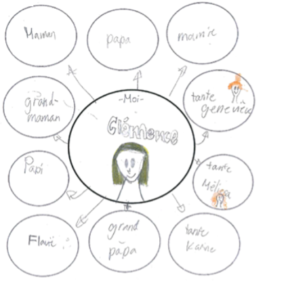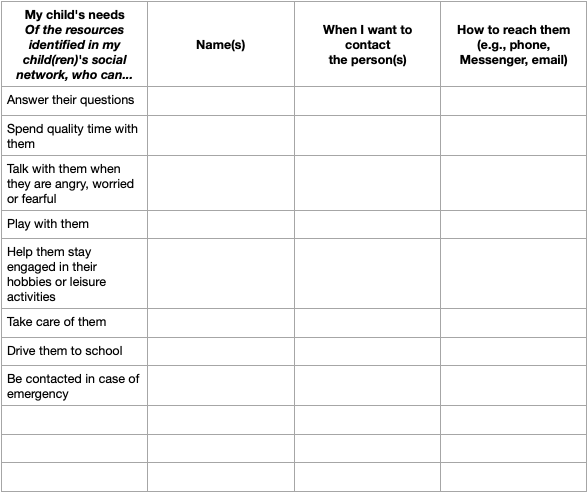The importance of your support network

What is a social support network?
A social support network refers to the people and resources you interact with on a daily basis that can provide you with support.
- Members of your family
- Friends
- Advocates
- Physicians
- Teachers
- Neighbours
- Colleagues
- People you meet through places such as a recreation centre or community organization
The importance of your social network
Having a social network is essential, as it provides resources that can play an important role in meeting your needs. You can reach out to your social network in various situations, such as to share your happy or stressful moments, to listen to you, to comfort you, to give you advice, to help you with your tasks or for any other type of support. Your social network can support you in your role as a parent and help you meet your child’s needs.
Sometimes it can be difficult to decode and understand your child’s needs, distress or experiences (e.g., when your baby cries or your teenager isolates themselves from others). In this situation, some parents may feel particularly stressed, overwhelmed or that they are unable to understand or meet their child’s needs. If this happens to you, don’t hesitate to contact someone in your network to get help (e.g., to babysit your child) or to have time to take care of yourself and then be more available for family life (e.g., relax or do an activity with your partner or child).
When you encounter a difficult situation in your life, in your family life or elsewhere, your social network can provide support and help you overcome the difficulties you are experiencing. Among other things, it can be helpful to discuss your concerns with someone in your social network that you trust. Doing so can help you feel less alone and allow those around you to better understand what you are going through.
Reflection Questions – My Support Network :
- Who can I share my joy and achievements with?
- Who can I turn to when I need support managing my day-to-day parenting tasks?
- Who can I turn to if I’m exhausted, sad or can’t cope with a situation?
- Who can I trust for advice about my child or my parenting?
My child’s support network
All children have important needs that must be met in order for them to develop in a positive manner. For example, they need to be fed, have a place to sleep, feel safe, receive affection, have fun, get clear answers to their questions (e.g., about a parent’s mental illness) and have strong social connections with peers and other important people in their lives. Having access to a support network can help your child develop meaningful and positive social relationships with people around them. These people and resources have the potential to help meet your child’s needs. We recommend talking to your child about who is there for them in everyday life or who could be there for them during times you are not emotionally or physically available.
- Explain to your child that talking to someone about what’s going on at home can feel good and that keeping emotions inside can make them feel bad.
- Help your child identify which adult(s) or friend(s) they feel safe talking to when they are feeling good, such as when they are feeling happy, or when they don’t feel well, such as when they are worried. Encourage your child to reach out to these people to talk to them.
- Ask your child questions to get them thinking about their support network (e.g., Who do you like to have fun with? Who can answer your questions if I’m not well?)
- Encourage your child to share any fears or worries they might have with you or another trusted adult.
- If necessary, make sure your child knows what to do and who to call if they feel unsafe, especially in one-parent families.
- Explain to your child that it’s okay to talk about what’s going on at home, and that they are not betraying their parents if they do so.
In reality, many children know who they can talk to, but they don’t. There may be many reasons for this, such as fear of betraying or embarrassing their parents or fear of how the person they are talking to might react. It is important to reassure your child.
Strengthening my support network
It is important to maintain and strengthen relationships with the people and resources in your, your family’s or your child’s support network. There are several ways you can strengthen these social ties.
For example :
- Create opportunities to spend quality time with these people
- Contact them by phone or email
- Thank the people in your network
- Provide them with help in completing a task
- Suggest that they do activities with your child
It can also be helpful to strengthen these relationships when you and your family are doing well so that you can reach out to your support network more easily when you are going through difficult times or major changes. In this sense, it is best to give advance notice to the people you have identified as emergency contacts for you and your child. Talking with them beforehand, during a time when you are well rather than during an emergency or a difficult situation, can reassure you that they will be available if you need them and make it easier for you to ask them for support if it is needed.
Asking for help
When you are going through times that are difficult or particularly stressful, it is important to find support and ask for help from people or resources within your social network. It is helpful to go to them for comfort and support. It is easier to ask for help when you have identified your needs and the person(s) who can meet them. Then, you can discuss your request for help with the person you have identified, specifying what you need and how the person can help you so that they can support you adequately. Conversely, asking for help can be difficult, especially when you feel overwhelmed or are not used to sharing your feelings and thoughts. It takes practise!
- Do you find it difficult to ask for help? If so, how could you ask for help if you needed it?
- What obstacles (e.g., shame, time, fear of disturbing others, etc.) sometimes prevent you from reaching out to your support network when you need help? What are possible solutions to overcome or reduce these obstacles?
- Who would you feel comfortable asking for help if you needed it?
Asking for help is a sign of strength and helps support the mental health of all members of your family. Your extended family, friends, community members and organizations can be important resources for you. Remember, when a parent reaches out for help, they teach their child that everyone needs help at different times in their life and that it is normal and beneficial to ask for support.
Some people already have a strong and extensive support network to support their family, their child and themselves. For others, their social network may not be sufficient to meet their needs, or members of their network may be overwhelmed or unable to provide support at certain times. If you feel isolated, need help or want to strengthen your support network, there are several options available to you. You may want to participate in self-help or support groups to talk with others who are going through a similar situation. Depending on your needs, you may want to talk to a professional or psychosocial worker, such as a psychologist, social worker, psycho-educator, early childhood educator, special educator or physician. These professionals will be able to listen to you, without passing judgement, ask you questions that will help you find solutions to the challenges you face and suggest possible solutions.
- You feel distressed
- You feel that comfort from your loved ones is not enough
- You have difficulty performing your daily activities
- Your loved ones see that you need help and tell you so
Telephone lines (available 24/7)
- Emergency Department : Call 9-1-1 for any emergency
- Info-Social 811 : Call 8-1-1 for a telephone service that allows you to quickly reach a professional in case of a psychosocial problem
- Suicide Prevention : 1-866-APPELLE (277-3553) for suicide prevention support
- Ligne Parent : Call 1-800-361-5085 or use the online chat function to talk to a professional about the challenges you face as a parent
- CAP santé mentale : Call 1-855-272-7837 to find out about organizations that provide services to children who have parents with a mental illness and to get support
For more resources, visit this page.
Reflective activity sheets : My support network
We invite you to complete a few activities that will help you think about the social relationships you and your child have in your lives and how to strengthen these connections. These exercises will also help you identify how these relationships can support you, your family and your child. If necessary, ask a friend, family member or significant other to help you with these activities.
My support network
We invite you to take an inventory of the resources that are part of your support network.
- Who can I turn to if I am exhausted, sad or worried?
- Who can I turn to for help or advice when I have a problem?
- Who can I trust to take care of my child if I feel too ill?
- Who likes the same activities as me? Who recognizes my skills and abilities?
- Who can I count on in an emergency?
- Who do I turn to most often? With whom does my family have the strongest ties and why? Which people in my network are most important to my family?
- Are there other resources (people, places, activities, etc.) that I would like to add to my support network in the future? If so, which ones and why?
*This exercise is also available online at https://lapproche.uqo.ca/guide-jeunes-outils-ton-cercle-de-soutien [French only]
1) Write your name inside the centre circle of the blank diagram below or in the centre of a blank page, whichever you prefer.
2) Write the names of people in your support network in the other circles connected to yours.
> Those who are most important to you should be placed near the centre circle. Those who you consider less important should be placed further away.
3) Options :
a) Use different colours for different resource types. For example, you might use red for family members and yellow for friends.
b) For each resource identified, use one key word to indicate the role they play in your life, your child’s life or your family’s life. If you would like, you can also indicate the role you play in each of your resource’s lives.
c) If you would like, mark the people you can rely on in case of emergency with a star.
My diagram!

What do you like about your support network?
………………………………………………………………………………………………………………………………………………………………………………………………………………………………………………………………..
What would you like to improve about your support network?
………………………………………………………………………………………………………………………………………………………………………………………………………………………………………………………………..
What can you do to strengthen your relationships with the people in your network?
- ……………………………………………………………………………………………………………………….
- ……………………………………………………………………………………………………………………….
- ……………………………………………………………………………………………………………………….
My child’s social network
We now invite you to take a few minutes to identify the resources that are part of your child’s support network. You can use a blank page for this exercise.
Remember that we all experience relationships differently and your child may view their social network differently than you do. We recommend doing this exercise with your child and providing them with space to make their own support network diagram. This activity will allow you to discuss the topic together in a fun way. If this is not possible, show your child the social network diagram you made for them to get their input on the resources and people identified.
(Examples of diagrams made by children)


My child’s go-to people
This next exercise allows you to identify the people your child could turn to for help in more specific situations. Using the diagram of your child’s social network made earlier, identify the person(s) your child would feel comfortable asking for help in meeting their basic needs. As you answer the following questions, think about who can be there for your child when you are not physically or emotionally available. You will also be asked to identify times when you could contact each of the people identified, to strengthen your relationship with them and ask for their support, as well as how you plan to reach them.

Exercice adapted from « My child’s support network », The Children of Parent with a Mental Illness national initiative, 2019
A big thank you to Stephanie and Adela, parent members of the LaPProche advisory committee, for their collaboration and involvement in the designing of this fact sheet.
This content was developed at the Université du Québec en Outaouais by the Research and action laboratory for people with mental health problems and their loved ones (LaPProche) with funding from the Fonds des services aux collectivités (FSC2018-013) of the Ministère de l’Enseignement Supérieur and in collaboration with CAP santé mentale.
The information contained in this sheet does not replace seeking professional advice. If you have any questions or concerns, please see a professional.
References
Beardslee, W.R., Martin, J., & Gladstone, T. (2012) Family Talk preventive intervention manual. Boston Children’s hospital: FAMPOD. https://fampod.org/
Piché, G., Villatte, A., & Habib, R. (2019). Programme FAMILLE+. Manuel du parent [document inédit]. Université du Québec en Outaouais : Laboratoire de recherche et d’actions pour les personnes ayant des problèmes de santé mentale et leurs proches (LaPProche).
Piché, G., Villatte, A., Habib, R., & Vetri, K. (2019). Programme FAMILLE+. Manuel de l’enfant [document inédit]. Université du Québec en Outaouais : Laboratoire de recherche et d’actions pour les personnes ayant des problèmes de santé mentale et leurs proches (LaPProche).
The Children of Parent with a Mental Illness (COPMI) national initiative (2019). My child’s support network. http://www.copmi.net.au/.
The Children of Parent with a Mental Illness (COPMI) national initiative (2019). Communicating with babies. https://www.copmi.net.au/parents/helping-my-child-and-family/talking-about-mental-illness/babies
Villatte, A., Piché, G., & Habib, R. (2020). Quand ton parent a un trouble mental. Conseils et témoignages de jeunes. Université du Québec en Outaouais : Laboratoire de recherche et d’actions pour les personnes ayant des problèmes de santé mentale et leurs proches (LaPProche).
To cite this document, please provide the following reference: LaPProche Laboratory. (2021). The importance of your support network. Université du Québec en Outaouais.
© LaPProche 2021| lapproche.uqo.ca
All rights reserved.
Any reproduction in whole or in part by any means whatsoever is prohibited without the written permission of LaPProche.





